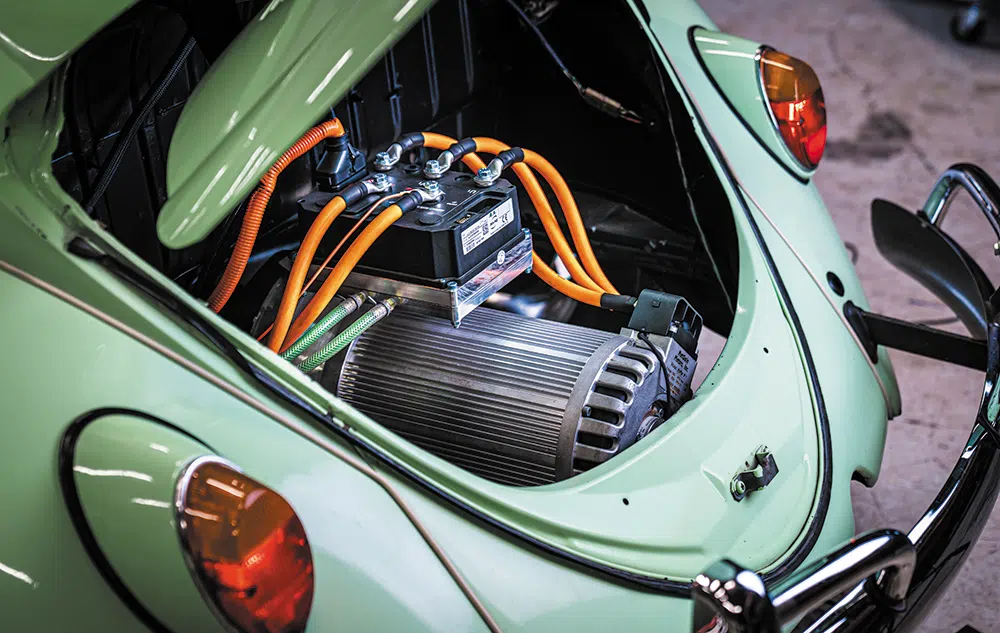 LEGACY EV
.
May 08, 2023
.
Electric Vehicle Features
LEGACY EV
.
May 08, 2023
.
Electric Vehicle Features

In 2021, 260 workers walked out of the GM Transmission plant in Warren, Michigan, for the last time. As gas-powered components such as engines continue to be phased out, how will we ensure that quality automotive employment will not suffer the same fate?
These sectors are at the greatest risk as businesses and governments alike transition to electric transportation. For decades, no major US automaker has entirely outsourced these jobs because of the pride that “Made in America” brings when seen etched into the engines that roll off a US assembly line. As the automotive industry transitions to EVs, we need to keep this in mind: Just as the engine and transmission make the heart of an ICE vehicle, the same pride can be felt in the heart of an EV—the battery, the motor, and the controller.
According to the Center for American Progress, nearly one million Americans worked in jobs related to engines and transmissions in 2020. If these people are not trained to work in new manufacturing positions around batteries, electric motors, and thermal management systems, we not only risk locking in our reliance on imported vehicles and components for decades to come, but we also risk losing what has long been a source of high-quality, unionized jobs that support a strong middle class.
Then, beyond the manufacturing sector, many mechanics are worried with less EV maintenance, how will they keep their repair shop afloat? Wrenchology estimates that 34% of conventional mechanics’ shops are projected to close in the next 10 years if they don’t develop a plan to up-skill their workers in new EV and automotive technology repair. Rest assured that Legacy EV has partnered with numerous EV industry leaders to form the first ever EV Technician Education Council (EVTEC) to protect these valuable middle-class jobs.
When Legacy EV initially partnered with the Carol Shelby American Automotive Program last year to develop the first accredited EV college course at Northeast Texas Community College, auto techs everywhere breathed a sigh of relief that they finally had a path to certify themselves in high voltage safety and confidently accept EV repair work rolling into their shops.
Legacy EV developed standardized education that can be adapted to multiple levels of education, with industry-based training that has been peer-reviewed by multiple manufacturers…
Unfortunately, the EV industry is growing quicker than standards and courses can be made, approved, and funded. So, how do you get a board-approved EV college program started when the standards, credentials, and certifications don’t exist? You head straight to the White House. Legacy EV President and Co-founder, Mavrick Knoles, was invited to President Biden’s Infrastructure Talent Pipeline Challenge and he came with an agenda: EVTEC should be the EV Technician certifying body that will develop, approve, and certify EV training credentials. EVTEC is a 501c3 nonprofit board of EV industry leaders who have created the first ever EV Education Standards and Certification test. And although they are still going through an industry peer review process, they’ve offered EV Builder’s Guide a sneak peak of their content.
EVTEC has developed more than 140 standards that focus on core concepts of knowing EV components and the ability to perform the skills required to build, service, and maintain them. Core learning concepts include electrical theory, high-voltage safety, general maintenance and services, wiring, communications, controls, commissioning, and of course, working on the three major systems of an EV powertrain: the motor, the battery, and the charging systems.
Skills in these standards are centered around diagnosing EV-related problems, troubleshooting electrical systems, interpreting vehicle data, and using computational thinking to verify functionality of the interrelated EV systems. Further, they are requesting industry endorsements of these standards, so they can make EV education more quickly accessible to schools, businesses, and individuals. If you, your company, or your local representative is interested in formally recognizing the need for these standards, please use the QR code to access an endorsement letter template.
It is predicted that the E-mobility value chain will create several times more jobs than those that will be lost, and with the majority of those jobs in manufacturing (24%), maintenance (39%), and installation (11%), the need for comprehensive EV training is past due. Especially with major OEMs, like Toyota, GM, Ford, and Tesla all with North American Gigafactory projects underway, it is obvious that a product-agnostic EV education offering is going to be vital to middle-class workers and the next generation of auto technicians. And since EVTEC’s EV Technician Standards were born out of the Legacy EV Certified Technician Program, they have over a year’s head start on development and peer review.
The Legacy EV Certified Technician Program prepares individuals with the skills needed to safely handle these components while teaching them the theoretical foundations behind how these components operate and integrate as systems. With this tool kit they can make an impact at any company that builds, services, or maintains EVs and their components. The Legacy EV workforce development curriculum aims to ensure that every community has the skills, training, and hands-on experience to support the EV transition.
Legacy EV developed standardized education that can be adapted to multiple levels of education, with industry-based training that has been peer-reviewed by multiple manufacturers, such as ReVolt Systems, Torque Trends, and Thunderstruck Motors. Legacy EV works closely with industry professionals, OEMs, and research institutions to ensure that the curriculum is product agnostic, updated frequently, and adapted to labor market demands.
The Legacy EV Certified Technician Program prepares individuals with the skills needed to safely handle these components while teaching them the theoretical foundations behind how these components operate and integrate as systems.
So, while EV programs are slow off the line at the college level, Legacy EV’s Certified Technician Program has that instant torque that’s just what technicians need to become an official Level I EV Technician with their peer-reviewed and proctored certification test set to roll out with the first training of 2023 on March 6.
Spots are limited to 20 participants per monthly cohort, so head to LegacyEV.com to reserve your seat in the foundational in-person course that has set EV certification in motion on a national level. Further, if you are a US school or education institution and you’d like to learn more about implementing EV curriculum or the EV education funding available to you through the Infrastructure Pipeline, the Inflation Reduction Act, or statewide initiatives, please reach out to the Legacy EV Education team today at education@legacyev.com.
We use cookies to enhance your browsing experience, serve personalized ads or content, and analyze our traffic. By clicking "Accept All", you consent to our use of cookies. Visit our Cookie Policy for more info.
Notifications
Share Link